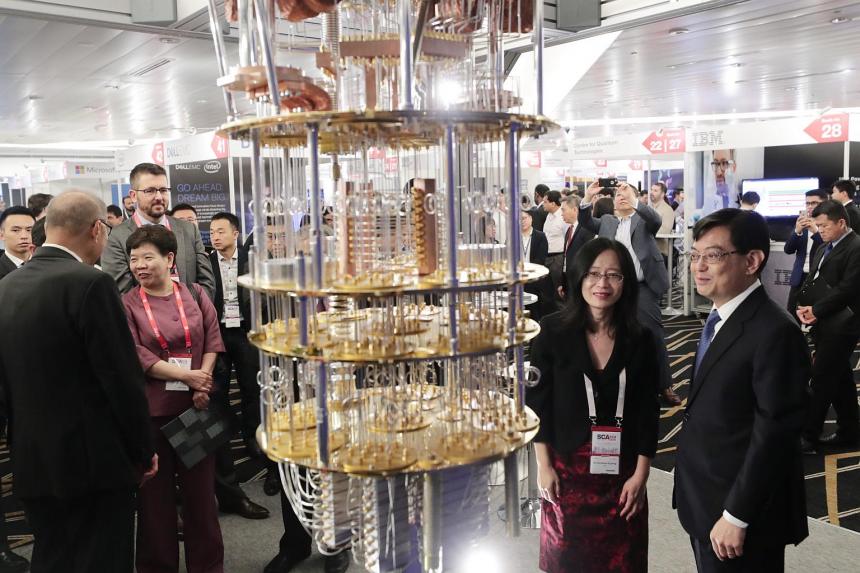SINGAPORE - Singapore is stepping up its investments in quantum computing with two new initiatives aimed at boosting talent development and providing better access to the nascent technology.
Deputy Prime Minister Heng Swee Keat on Tuesday (May 31) announced the launch of the National Quantum Computing Hub, which will pool expertise and resources from the Centre for Quantum Technologies and other institutions, and the National Quantum Fabless Foundry.
The foundry will develop the components and materials needed to build quantum computers and devices.
The hub will also host Singapore's first quantum computer of its own and allow companies and government agencies to access and test it out directly instead of over a cloud network, which means less lead time and lag.
"Our investment in quantum computing and quantum engineering is part of our approach of trying to anticipate the future, and proactively shaping the future that we want," Mr Heng said in his opening address at the second Asia Tech x Singapore (ATxSG) summit.
The event at The Ritz-Carlton, Millenia Singapore hotel is organised by the Infocomm Media Development Authority.
"The greater the potential of cyberspace, the greater the cyber risks. Malicious actors will seek to profit from these through any means. It is not sufficient to try to stay one step ahead. If we do, we often end up one step behind, chasing down and closing the last threat.
"To counter them, we not only need to remain vigilant to present threats, we must also stay invested to stay much further ahead."
The hub and fabless foundry are part of the National Research Foundation's Quantum Engineering Programme (QEP), along with the National Quantum Safe-Network announced in February.
The three initiatives will receive at least $23.5 million from the QEP for up to 3½ years under Singapore's Research, Innovation and Enterprise 2020 plan.
Dr Alexander Ling, director of the QEP, said the new hub will help train users in companies or government agencies to be more "quantum-literate" and understand the capabilities and limitations of quantum computing technology.
He added that building a quantum computer will also help Singapore understand the challenges associated with constructing and maintaining one.
Quantum computers make use of the quantum properties of special materials to encode information.
These materials cannot be produced in conventional foundries that manufacture silicon-based semiconductors as the manufacturing and operations processes can involve temperatures close to absolute zero and fabrication of materials on the scale of atoms.
While conventional computers store data in bits that can be represented as either a 1 or a 0, quantum computers use quantum bits or qubits that can exist as both simultaneously.
The fastest quantum computer is more than 150 million times faster than the quickest conventional supercomputer and can solve in minutes a problem that would take a supercomputer 10,000 years.
Industrial applications include optimising logistics, financial portfolios or chemical processes.
Mr Heng, who is also Coordinating Minister for Economic Policies and chairman of the National Research Foundation, said investing in quantum computing is one of three ways Singapore is responding to recent disruptions, global trends and new post-Covid-19 challenges.

He added that the country needs to remain open-minded on other emerging tech such as crypto assets and also increase public-private collaboration to unleash the Republic's potential.
One example of the nation’s efforts to foster collaboration is the Singapore Trade Data Exchange (SGTraDex), which was launched at last year's ATxSG event.
Mr Heng said the platform is a common data infrastructure for the sharing of regulatory, logistics and trade financing data, which will enable supply chain players to optimise cargo handling and operations and build confidence in trade financing.
Three use cases have been successfully piloted over the past year to test the value of SGTraDex - strengthening the financing integrity of trade flows, enhancing end-to-end visibility of container logistics flows and digitalising the bunkering industry.
Giving an update on the next phase of SGTraDex, Mr Heng said there are plans to include a few more use cases, including green and sustainable trade financing.
"We will seek to enrol more companies within the supply chain ecosystem onto SGTraDex," he added. "Over time, we hope to expand SGTraDex beyond our shores and contribute to the optimisation of supply chains abroad."
Communications and Information Minister Josephine Teo will announce more details on the expansion of SGTraDex at ATxSG on Wednesday, Mr Heng said.


